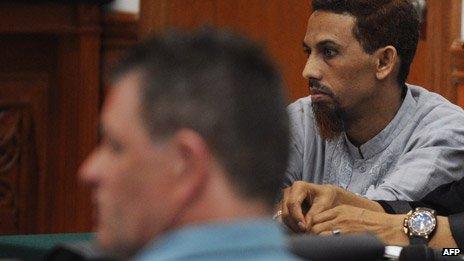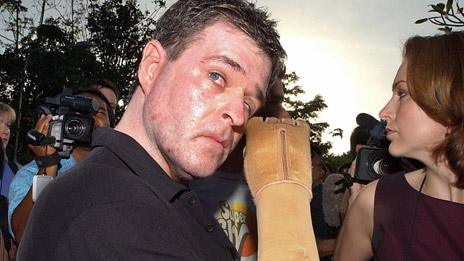Bali bomb survivor: How my life has changed
- Published

A court in Indonesia has jailed for 20 years Umar Patek, the man accused of making the bombs which killed more than 200 people in Bali in 2002. Among those killed were 88 Australians - and among those who survived was Peter Hughes, from Perth.
"I was just ordering a drink at the bar, when the first blast went off. I thought it might have been gas explosion," he recalls.
He said he found himself dazed by the explosion and staggered outside.
"It was a bit like a war zone," he says. "There were people who's hair was smoking and others with their clothing shredded."
But the horror wasn't over.
"Then there was a second blast, a car bomb, I think and that created more chaos. I knew I was injured, but I didn't feel any pain. I just remember seeing lots off bodies everywhere. You don't forget that," he said.
The hours and days ahead would reveal that there would be 202 bodies, nearly all tourists, drawn to Bali on the promise of a few days or weeks in Paradise.
"I'll never forget 12 October 2002," says Peter. "We were supposed to have a few drinks with some friends. I still can't believe what happened, it's like living someone else's experience."
At his new, white-walled, apartment in central Perth, Peter pulls out a large brown book.
It's his Bali photograph album, filled with the images, articles and headlines of the attack and nearly each one featuring Peter, himself, in its aftermath.
In one photo he's unrecognisable, his face bloated by the ferocity of the debris hitting his face during the attack.
In another, the only bits of his body visible are his finger and toe tips, everything else is covered with bandages as part of the hospital attempts to heal his burns.
"I had to be put into a coma for a month," he says. "To reduce the pressure on my brain. It's taken 10 years to get fully well."
At that point Peter lifts the trouser on his left leg to reveal a deeply scarred calf. He then lifts his shirt to show me where a shard of glass lacerated his stomach.
"I was covered in so many cuts and wounds, these are just the worst ones," he says.
"I feel lucky," says Peter, in one unexpected comment.
"I don't get many nightmares, or flashbacks and I don't mind asking about it as I feel it's better to be open about what I went through."
Peter Hughes hasn't been a bystander to the trial of Umar Patek.
At the request of the authorities, he travelled to Indonesia to give a witness impact statement to the judges.
"I didn't want to go," he says. "But I felt I owed it to the families of those killed, to give them a connection between those who lived and those who died."
It was a painful process.
Peter came face to face with Umar Patek in the courtroom, sitting just a few paces apart from each other.
"I just said what I wanted to say," says Peter. "I said that the bombings had left me feeling isolated, depressed, lonely, but, above all, very, very angry."
His opinion of Patek, himself, is equally stark.
"He's nothing, just a coward," he says.

Hughes in Bali for the trial of Amrozi Nurhasyim in 2003
You don't have to spend too much time in Peter's company to feel his intensity.
He admits that he's gone from being a carefree, 42-year-old man who went to Bali as part of his everyday mission to enjoy himself, to being a more introverted 52-year-old, somewhat reflective and much more serious.
"I have changed, but I try to just live my life as best I can," he says.
During his extended period of convalescence, Peter has immersed himself not only in his own construction company, but also in setting up a burns foundation to help people caught in fires.
"I don't have feelings of guilt, like some people who survive horrific experiences," he says. "But I do feel as though I have to give something back and the Burns Foundation helps me do that."
With the end of the trial and the 10th anniversary of the bombing approaching, Peter finds himself in a contemplative frame of mind.
"I try not to be bitter, I try to see the best in people, but I also see the worst," he says.
"I am, by nature, an aggressive person, but the Bali attacks helped make me a more humane person, a more compassionate one. I think the experience has actually made me a better person."